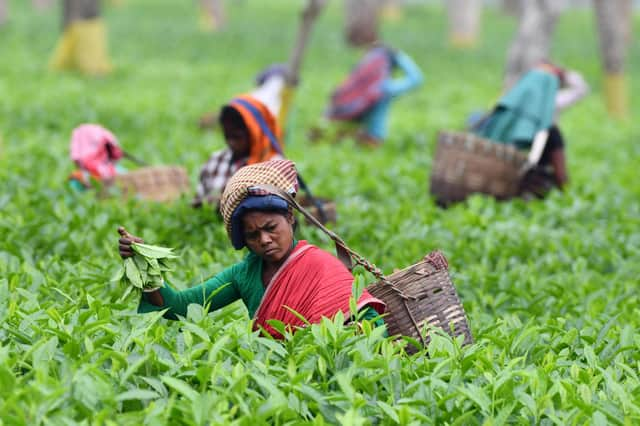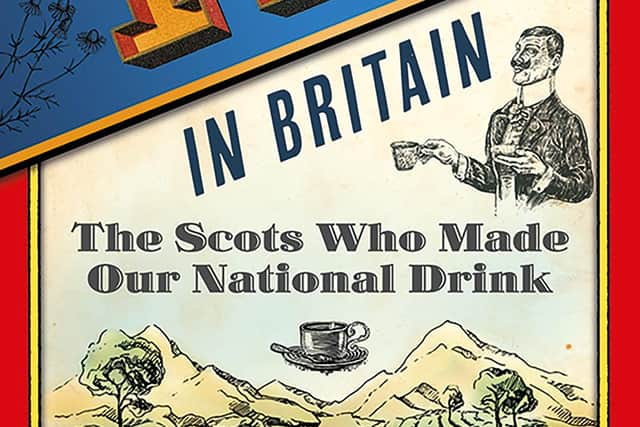Book review: Putting the Tea in Britain, by Les Wilson


This is a splendid book. It has the subtitle “The Scots Who Made Our National Drink”, which, Les Wilson asserts, is tea, not whisky. Perhaps as many as 165 million cups or mugs of tea are drunk in Britain every day. Yet it was a latecomer to our shores. Neither Shakespeare nor Mary Queen of Scots ever tasted “the cup that cheers but does not intoxicate.”
Wilson’s book is a mine of information. In the 18th century all tea came from China. If I ever knew this I had forgotten. Tea as we know it is perhaps our most notable legacy from the British Empire and the often brutal imperialism of the East India Company. More precisely, it was a young Borderer, Robert Fortune from Edrom, who, disguised as what was then known as a Chinaman, stole jealously-guarded tea plants and seed from China and brought them to the Botanic Gardens in Calcutta. At that time there were no tea plantations in India, and, astonishing though it seems now, very few Indians had ever drunk tea.
Advertisement
Hide AdMeanwhile Robert Bruce, an Edinburgh man and a major in the Bengal Artillery had discovered tea bushes growing wild in Assam and his brother Charles was commissioned to head a Government-sponsored project to develop tea there. This was the starting point, though at first the Bruce brothers had had “to battle against deep-rooted China tea snobbery.”


What happened in Assan would be followed elsewhere, further north in Darjeeling, then in Ceylon, then in what is now Malawi and Kenya. In all this young Scots took a leading role, and Wilson supplies brief biographies of these remarkable men.
Imperialism and the British Empire get a bad press today. Many here in Scotland are ashamed of it, or profess to be ashamed of what is seen as exploitation. Wilson doesn’t shrink from the hardship and the often cruel discipline imposed on the coolies who laboured in the tea-gardens. He quotes some letters planters sent home to their parents, and even for those of us who still take pride in our empire and believe it did more that was good than bad, they make for uncomfortable reading.
On the other hand if one side of the coin is exploitation, the other side is development. The post-imperial states of India, Sri Lanka and Malawi have all benefited and been enriched by these hard-working and ambitious young Scots. Wilson gives brief biographies of many and they are fascinating.
Take, for example, James Taylor, who became known as “the Father of Ceylon Tea.” Born in 1835 in Auchinblae, Kincardineshire, educated at the village’s Free Church school where, be it noted, he was taught both Latin and Greek, he was persuaded by a cousin who was “in coffee” in Ceylon to seek his fortune in the East. The coffee plantation was soon devastated by disease. “No such calamity had befallen Scotch colonists since the Darien disaster” in the view of another Scots planter from Aberdeenshire. Taylor did not repine. He guessed that “tea could be the estates’ salvation” and “Within a few years he had between fifty and a hundred acres under tea.”
Now Sri Lanka exports more tea than India and China. Taylor never returned home. He lived with a Tamil girl and left money to her and their children in his will. There were others like him all over the East and most of the tea estates were given names recalling Scotland. No wonder the English Radical politician, Sir Charles Dilke, found it “strange, indeed, that Scotland has not become the popular name for the United Kingdom.”
Advertisement
Hide AdWilson’s book is rich in fascinating detail and fascinating stories. It deserves to sell like hot cakes washed down with a fortifying blend of Assam and Ceylon tea. One reads it full of admiration for the enterprise, vigour, courage, hardihood, intellectual curiosity and self-confidence of Scots in the 19th century, indeed well into the 20th. One closes it wondering sadly where these qualities – that self-assurance – are to be found in Scotland today.
Putting The Tea In Britain, by Les Wilson, Birlinn, 250pp, £14.95
A message from the Editor
Advertisement
Hide AdThank you for reading this article. We're more reliant on your support than ever as the shift in consumer habits brought about by coronavirus impacts our advertisers.
If you haven't already, please consider supporting our trusted, fact-checked journalism by taking out a digital subscription at https://www.scotsman.com/subscriptions